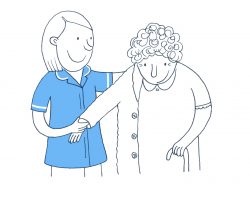How to help isolated people tackle loneliness

Feeling isolated and lonely is an increasing problem across the country, affecting millions of people and putting more pressure on our already overstretched public services.
Identifying those in need is not easy – even to those directly involved – and doing something about it can be even more difficult before severe depression sets in.
There are thought to be just under 10 million people in the United Kingdom who say they are always or regularly feel lonely. It is something that can come on very quickly and can soon spiral down into a black tunnel of depression that can be difficult to recover from.
Loneliness can be brought about by a number of life-changing circumstances that may include bereavement, divorce, separation or retirement. The onset of depression, which is the next logical progression, is hard to recognise but needs to be tackled by either seeing your GP, seeking help from a number of organisations out there, or taking steps to do something about it yourself.
Being lonely or isolated does not just affect the elderly, or those with health and mobility issues. It can affect anyone. The results can be extremely debilitating and ultimately put a greater strain on our public services.
Many people live with a disability or chronic illness which can make it incredibly difficult to leave the house. Some coming out of difficult situations like domestic violence or separation can feel like avoiding contact at all costs.But it’s important to recognise the symptoms of loneliness and then do something to counteract them.
- Try and stay active and eat and sleep properly. It is easier to stay on top of the demons of loneliness, isolation and depression if you stay as fit and healthy as you can.
- Feeling better in yourself means feeling better about life and better able to deal with issues that may arise. It also leads to being more confident and hopefully remaining independent.
- It is also important not to shut yourself away. Talking to other people is good therapy, whether it be reasoning something out by taking advantage of a new perspective or just talking, giving you the feeling that you are not alone in the world.
- Try and stay in contact with family and friends – wherever they are. The internet offers an ideal opportunity to reach out to people who may be far away and if you do not have a computer visit the local library, where they will be happy to help you get online.
- If you are relatively active try getting out into the community. There are a whole range of groups and organisations you can get involved with and maybe even volunteer to help someone else. This gives a real sense of achievement.
Whatever you do, do something. Spot the signs of loneliness and seek support before it progresses from a temporary state to a chronic one and then on to a rapid deterioration in health. Remember, you don’t have to be lonely and there is something you can do about it.
17.10.2017
